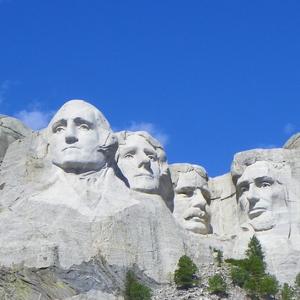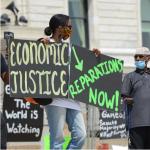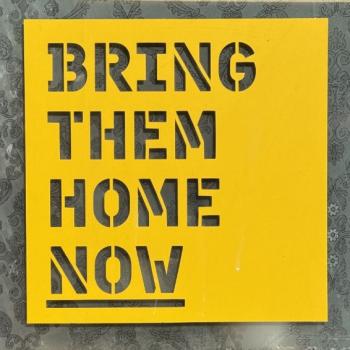Christian nationalism calls us to merge our national founding documents with Christianity’s “key” documents. The Declaration of Independence (et al) meets the Ten Commandments (et al). Christian nationalists claim that America, ruled effectively by both sets of documents in combination, would make America great again.
We’ve been making our way through the Ten Commandments (full series here) to see whether they are compatible, and whether a Ten Commandments-based country would really be a Christian nationalist’s dream come true.
We’re almost to the end of the series! It’s time for “Thou shalt not bear false witness against thy neighbor.” In this post, we’ll look at some ways America and Americans have historically violated this commandment; next time, we’ll talk about its relevance right now, today. (Sign up for my newsletter here so you don’t miss a post!)
One Lutheran church has this to say about “Thou shalt not bear false witness against thy neighbor”:
You shall not give false testimony against your neighbor.
Our good reputation is [a] gift from God.
We have the duty to speak in such a way about individuals or situations that we are putting the best construction on them and speaking about them in the kindest possible way, even as God treats us kindly, with mercy and compassion, through Christ our Lord.
I was taught that this commandment means “don’t gossip” and “when you grow up, don’t lie under oath” – but there’s much more to this than our Sunday School teachers taught us.
More than most Christian nationalists would like, I daresay.
Denying the truth – founding fathers
Slavery has often been called “America’s original sin.” We had enslaved Africans here even before our country was born. And yet, our first founding document, the Declaration of Independence, proclaims, “We hold these truths to be self-evident, that all men are created equal.”
In fact, our Constitution spelled out how “equal” we were: each enslaved African counted for three fifths of a white person.
George Washington owned human beings. So did James Madison and Benjamin Franklin. Thomas Jefferson – the guy who wrote the Declaration – owned human beings, and even kept an enslaved woman as a mistress.

Our sainted founding fathers either didn’t know what the word “equal” means, or denied the truth: that the country they were forming was built on hypocrisy and white supremacy (spoiler alert: they knew).
Yes, they had hopes that the institution of slavery would be done away with soon, but their inaction at the get-go allowed slavery to endure for a total of over 240 years.
Did they “bear false witness” against their neighbors? Yes. This is a fact of history.
Denying the truth – Southern states
When Americans finally began to wake up, decades after Jefferson penned “all men are created equal,” the Southern states made a collective exit from the Union. The Civil War resulted in something like 620,000 American deaths.
Twenty percent of Southern white males were killed defending their right to own Black human beings. Think about that for a minute.
In spite of the Emancipation Proclamation, many whites (both northern and southern) couldn’t bear to look at African Americans as equals. And so, following the Reconstruction, we fought to keep our Black brothers and sisters down by any means at all. We humiliated, we imprisoned, we lynched, we cheated.
In White Rage: the unspoken truth of our racial divide (unsolicited endorsement), Carol Anderson comments on a newspaper article from shortly after the Civil War, that typified white justification of the so-called “Black Codes” (example):
The Southern states “just wanted to stop vagrancy and put an end to the undeniable evils of idleness and pauperism arising from the sudden emancipation of so many slaves.” By compelling them to work, the argument went, this measure prevented the newly freed from becoming a “burden upon society.”
What the paper failed to recognize was that black people’s willingness to work had never been the problem. Having to work for free, under backbreaking conditions and the threat of the lash, was the real issue.
Even our “Great Emancipator” had a degree of racism in his veins: “I am not,” Lincoln said, “nor ever have been, in favor of bringing about in any way the social and political equality of the white and black races.” The Emancipation Proclamation was not so much an advancement of equality as a military strategy. Its purpose was to undermine the Confederacy and enable Black slaves to escape to the North so they could fight in the Union army.
After the Civil War, thousands of freed Blacks were sent back to the African continent to live in what is now Liberia; Lincoln had plans of his own for a second location. Carol Anderson explains:
[Lincoln] had selected Chiriquí, a resource-poor area in what is now Panama, to be the new home for millions of African Americans. Lincoln just had to convince them to leave.
In August 1862, he lectured five black leaders whom he had summoned to the White House that it was their duty, given what their people had done to the United States, to accept the exodus to South America, telling them, “But for your race among us there could not be war.”
As to just how and why “your race” came to be “among us,” Lincoln conveniently ignored.
Lincoln was guilty of multiple levels of denial here:
- He denied the obvious fact that the war was not in any way the fault of the Black enslaved people, but of the enslavers.
- He denied the Black leaders’ intelligence: what he said was preposterous, and they knew it, but you don’t talk back to the president who just emancipated you.
- He denied the former slaves’ right to self-determination when he decided where they were to go.
In short, Lincoln as President of the United States, violated the commandment, “thou shalt not bear false witness against thy neighbor.”
Next time, we’ll return to the present day and talk about how Americans are (or aren’t) dealing with the facts of our sordid history.
(If you are energized by challenges to the evangelical status quo like this, please subscribe to my newsletter! If you would like to comment on this post, please pop over to my Facebook page. All of my posts are there and open to constructive comment! I welcome your thoughts.)
OTHER POSTS THAT MIGHT BE OF INTEREST:
- Christian nation series: “Thou Shalt Not Steal” and reparations
- Christian nation series: a Christian case for gay marriage
- Christian Nation series: would Jesus agree with “biblical” divorce?
- The “America is a Christian Nation” hoax, revealed
- Did you know? The “pro-life” party is also pro-suicide
- Is there such a thing as too much Scripture?














